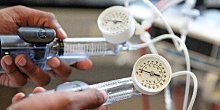The interaction between the human organism, sensors, the technical equipment and the alogrithms mapping this interaction is essential to biomedical engineering.
We are becoming increasingly dependent on advanced equipment for patient diagnosis and treatment—e.g. imaging equipment such as PET scanners for studying molecular processes in cancer, life-sustaining equipments sucha as pacemakers, DNA chips for studying the genome and deep learning-techniques for investigating and exploiting huge amounts of clinical data.
Biomedical Engineering is an interdisciplinary programme offered by DTU in collaboration with the Faculty of Health and Medical Sciences at the University of Copenhagen.
The study programme aims to provide MSc students with solid knowledge of the clinical problems facing the modern healthcare sector, enabling them to develop new technological solutions. Therefore, the study programme covers both engineering and human physiology courses, ranging from the functions of the organs at cell level to modelling physiological processes in the locomotive apparatus.
You will have the opportunity to work in close collaboration with both Danish and international companies - either as part of the courses, as an individual project or while writing your thesis.
The MSc is a two-year graduate programme with a workload of 120 ECTS credit points.









